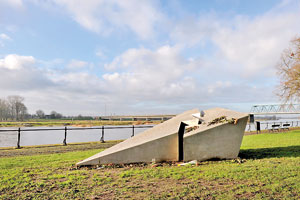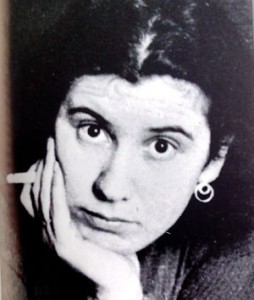Finding inner peace amidst a time of persecution
 “I am a happy woman and I sing praises to this life, yes, you read correctly, in the year of grace 1942, the umpteenth year of war.”
“I am a happy woman and I sing praises to this life, yes, you read correctly, in the year of grace 1942, the umpteenth year of war.”
In 1980, almost 40 years after her death in the concentration camp at Auschwitz, Etty Hillesum’s diaries and letters were revealed, edited and published in Holland – and immediately translated into many languages. They displayed the inner evolution of a young woman who lived under Nazi rule, and who eventually met a German man who unveiled the latent spirituality in her. This made her accept her fate – the unavoidable mass extermination – not like a victim but with a mind free of fear and hatred.
Holland had been a refuge for the Jews in Europe for over 400 years – until the German army took over the country in 1940. 90% of the population of 130,000 Dutch Jews did not survive the Holocaust.
Esther (Etty) Hillesum was a Dutch Jew born in 1914. Her father was a principal; her mother a refugee who fled from Ukraine’s pogroms. Etty made a living giving Russian lessons as well as being the housekeeper cum lover of a widower. She had had several lovers and to a certain extent considered herself an erotic expert.
In 1941, Etty Hillesum met a therapist, Julius Spier, a German Jew who had taken refuge in Holland. During their quasi-erotic but chaste relationship, Spier, a follower of Carl-Gustav Jung, would show her the way to transfer her love for one person to a love for all, for humankind – for God.
About one month after their first meeting, Etty began a diary: she made a note of her frustrations as well as her evolving belief; faced with major events from the outside world, she proceeded to introspection. “I meditate, I turn into myself, and this ‘myself’, this most inner and richer layer in my own self, I call it ‘God’.” This ‘God’ whom little by little she learns to name and address, is not an outer force but must be sought inside – ‘Help yourself, and God will help you’: “We must not expect God to help us, but we need to help God.”

Etty Hillesum and above, her memorial at Deventer, Netherlands
During a period of two years she used to jot down her thoughts, sometimes contradictory thoughts – acknowledging the difficulty of writing accurately. In a context of war and unprecedented suppression, she craved to become a writer in order to testify about the time she would have lived in, once it was over: “One day, if I survive everything, I will write about this period several little stories…” Indeed the period is unprecedented: “We never saw such a persecution under such a totalitarian form, organised at the scale of masses, encompassing the whole of Europe. Survivors will be needed to be the chroniclers of this era. I would like to be, humbly said, one of them.”
She was well aware of the Nazi aims: “For sure, it is complete extermination.” She got to know facts about the methods used in Germany, starting with the concentration camps. “In Germany, the Jews are walled up alive or exterminated by poison gas.” Facing the truth was fundamental to her: “‘They’ want our total extermination, we have to acknowledge the truth.”
She stressed the importance of understanding in order not to be defeated – beyond physical annihilation. Confronting the Nazi totalitarian machinery, Etty’s aim was to understand the reality of the outer world, refusing to feel like a victim. “For humiliating you need to be two: the one who humiliates and the one who is humiliated, but above all: the one who is ready to be humiliated.”
She tried to advocate abstinence. She got used to kneeling on the carpet of the bathroom and meditating – refusing to incriminate neither God nor any fatality. She tried to practise asceticism while performing daily chores such as washing plates.
Under the drastic restrictions imposed by the Nazis on the Jews in occupied Holland, she applied for a clerical job at the Jewish Council, an organisation set up by the Germans to keep lists of the Jews and send them to Germany, officially for forced labour. She was not taken in by what she was doing. She only hoped to bring some relief to her people. She denounced the “collaboration of a small part of the Jews helping for the deportation to the concentration camps of all the other Jews: this is an irreparable act. History will judge.”
Working first at the Amsterdam office, she requested to be transferred to the Westerbork camp – a transit camp in Northern Holland from where the Jews were directly sent to the concentration camps in Poland and Germany. The Westerbork camp was initially built in 1939 by the Dutch to put together the German Jews and other stateless Jews to help them to migrate to Palestine. But when the Nazis took over Holland, Westerbork became an annex to the concentration camps. Etty saw the convoys of prisoners being sent by special train.
Etty Hillesum refused to escape her fate which was that of her community as a whole: “Be clear, it is a mass extermination”. “If not me, it will be another one” because of the quorum decided by the Nazis.
On September 7, 1943, it was her turn. She, her parents, her younger brother (the talented pianist and composer Mischa Hillesum) climbed singing into a train for Auschwitz. All of them died –Etty probably on November 30, 1943.
Etty Hillesum was determined to fight against hatred: “The fierce hatred which we nurture towards the Germans pours a poison in our hearts.” They are wrong but their weakness is also our weakness: “Each one has to live with himself as with a crowd of people – discovering in his self all the good and bad sides of humanity.” Each one needs to forgive himself if he wishes to forgive the others.” “We have to acknowledge that we commit wrongs and errors.”
Finally, for Etty Hillesum, “if peace is to come one day, it will be genuine only if each one makes peace first of all with himself, eradicating all hatred against any race or any folk.”
Under the influence of Julius Spier, Etty read many Christian texts: the Bible, the Gospels, St. Francis of Assisi, Thomas a Kempis (The Imitation of Christ), but also the German-language poet Rilke, whom she would read constantly, almost daily, and carried with her to the extermination camps. Often she referred to Jewish mysticism in a way which goes beyond any denomination: walking with God, as she says, and that is also in her last known words: ‘The Lord is my upper room’– the prayer and meditation room in a Jewish house.
She also developed on the elevated room, described in the Gospel, where Jesus (even though not cited by her) and his disciples had the last supper. And it is in terms of communion (with the obvious Christian meaning here), partaking the bread and the wine, that she describes her volunteering for what she would have called, definitely not martyrdom, but the common man’s sacrifice.
Again and again in her diaries Etty Hillesum writes: “Life is beautiful.” And also: “Life is filled with meaning despite its absurdity.” That meaning is love.


